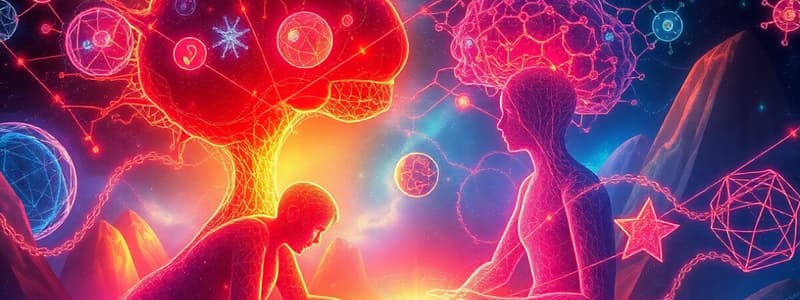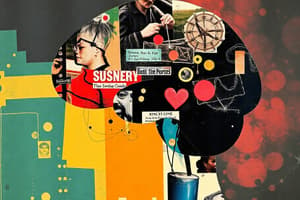Podcast
Questions and Answers
What is the main concept that explains cooperation among certain social mammals?
What is the main concept that explains cooperation among certain social mammals?
- Reciprocal altruism
- Social dominance
- Selfish behavior
- Mutualism (correct)
Which psychiatric condition is noted for involving deficits in social decision-making?
Which psychiatric condition is noted for involving deficits in social decision-making?
- Generalized anxiety disorder
- Bipolar disorder
- Social anxiety disorder (correct)
- Schizophrenia
How does mutualism differ from reciprocal altruism?
How does mutualism differ from reciprocal altruism?
- Reciprocal altruism includes later offset benefits. (correct)
- Mutualism requires a net cost.
- Mutualism exclusively occurs among relatives.
- Reciprocal altruism involves immediate benefits.
What gene variations have been linked to individual differences in social decision-making?
What gene variations have been linked to individual differences in social decision-making?
Which of the following animals is mentioned as an example of cooperation in social groups?
Which of the following animals is mentioned as an example of cooperation in social groups?
What does the Dictator Game (DG) illustrate about altruistic behavior?
What does the Dictator Game (DG) illustrate about altruistic behavior?
Which of the following methods is NOT typically used to study social decision-making in neuroscience?
Which of the following methods is NOT typically used to study social decision-making in neuroscience?
How is altruism defined in the context of the Dictator Game?
How is altruism defined in the context of the Dictator Game?
What role does functional neuroimaging play in understanding decision-making?
What role does functional neuroimaging play in understanding decision-making?
Which characteristic is true of the proposer in the Dictator Game?
Which characteristic is true of the proposer in the Dictator Game?
Flashcards
Mutualism
Mutualism
A type of cooperation where both partners benefit immediately from their actions.
Reciprocal altruism
Reciprocal altruism
A type of cooperation where one partner incurs immediate costs, but expects reciprocal benefits later on.
Oxytocin (OT)
Oxytocin (OT)
A hormone linked to social bonding and trust, potentially influencing social decision-making.
Neuropeptides and Social Decision-Making
Neuropeptides and Social Decision-Making
Signup and view all the flashcards
Social Decision-Making Deficits in Mental Health
Social Decision-Making Deficits in Mental Health
Signup and view all the flashcards
Dictator Game (DG)
Dictator Game (DG)
Signup and view all the flashcards
Altruism in the DG
Altruism in the DG
Signup and view all the flashcards
Proposal Magnitude in the DG
Proposal Magnitude in the DG
Signup and view all the flashcards
Functional Neuroimaging
Functional Neuroimaging
Signup and view all the flashcards
Study of Brain-Damaged Patients
Study of Brain-Damaged Patients
Signup and view all the flashcards
Study Notes
The Neuroscience of Social Decision-Making
- Social decisions are made in complex social environments, often involving conflicts between self-interest and the interests of others
- Game theory tasks, such as the Trust Game and Prisoner's Dilemma, are used to study social decision-making in the lab.
- Neuroscience tools (fMRI, rTMS, etc) investigate neural mechanisms underlying these decisions.
- Key social decisions include trust, reciprocity, altruism, fairness, revenge, social punishment, social norm conformity, social learning, and competition.
- Neural systems involved in reward, reinforcement, pain, punishment, mentalizing, delayed gratification, and emotion regulation are often recruited for social decisions.
- Prefrontal cortex plays a role in prudent social decisions, especially in stable environments.
- Research has identified individual variations in social decision-making.
Key Words
- Trust, reciprocity, altruism, fairness, revenge, norms
Abstract
- Social decisions are critical due to complex social environments.
- Game theory tasks and neuroscience methods are used to understand these processes.
- Social decisions involve several neural systems and psychological processes.
- Individual differences in social decision-making are also investigated.
Studying That Suits You
Use AI to generate personalized quizzes and flashcards to suit your learning preferences.




